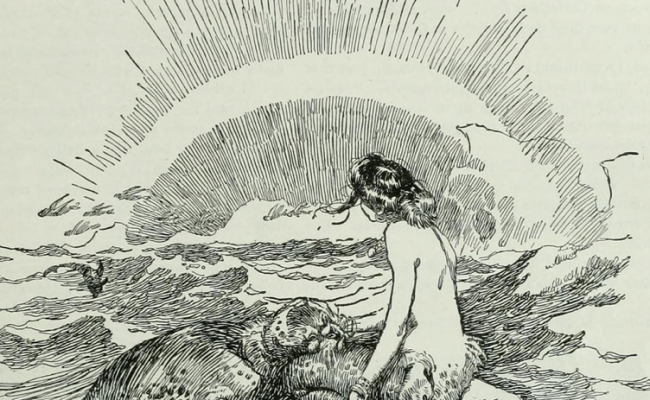The red-haired man drove to the bay with his father’s dinghy in a trailer behind him, nodding through the morning darkness. Rounding a corner, water spilled onto the horizon. Hills ringing the shore were still black but beneath them, the sea was bright. The bay was real again.
Steering down a steep curve, his lunchbox slid across the seat and stopped against his thigh. Egg sandwiches. He had made them himself that morning, slipped the eggs into deep oil and watched as opalescent bubbles popped up through the whites. Those treasures kept now between the clapped palms of the sandwiches.
He pushed out, hopped in and began to row. At first it seemed his muscles had lost the rhythm of haul and skim, and his progress was slow through the small waves. Then, clearing his throat, he began to speak. He looked to the hills the way he had learnt to and the words began to roll out, an unfurling of generations; his lineage recited into the wind. So he went, casting the net of his whakapapa wide across the water, letting his limbs find their stride.
He used no rod, a line was enough. It wasn’t long until he pulled his first fish from the sea. The fish when he held it high spun there in its glimmering grey skin, each clear eye taking turns to look, look at him. As he rowed back to shore, it died in the bottom of the boat.
The red-haired man stooped to pass under the branches of the pōhutukawa tree, imagining the roots it had muscled in the sandy soil, finding a cool place beneath its reach. Thick shade, thick salty smell, and the litterings of bones that were delicate suggestions of fish.
He said something, while sucking in his breath. It couldn’t be caught. All the sound passed back down inside him. Then he placed the fish, the first fish of the day, among the roots of the pōhutukawa and there it lay greyly; the shade of a fish beneath the shade of a tree and still, one eye, look.
Turning back to the boat, pushing out for the second time, the morning was fully light and the red-haired man saw colour in the hills, flush brown and green without the cutting marks of any road.
A little while and he was sitting in the boat, and he had eaten the sandwiches, and no one could say what he was thinking, when a droning sound began. Far off, not so far off, close. The forthright smell of diesel. A boat pulled alongside, the engine idled, and there stood a young man, his legs spread wide.
‘You can’t fish here,’ the young man said, ‘This is Māori land.’
The red-haired man did nothing, then shifted in his seat. Just enough to get a look at the boy.
‘Is that right?’, he replied, his voice diminished under the noise of the motor. He looked down towards his feet. Reached out with one hand to caress the edge of the dinghy in a place that was worn smooth. He considered his catch; grey glimmers and looks from the bottom of the boat.
‘Been catching much then, have you?’ he enquired.
‘Yeah, been catching heaps,’ the young man said.
‘I see, I see. Ka pai.’
A snort from the young man.
For a while then, only the young man’s metal boat, giving the water something hard to slap. Only the hills all around, seeping their green-browns into the water. And over on the shore, the pōhutukawa, reaching.
‘Let’s go see your first fish then’, the red-haired man said.
A sound of surprise escaped the young man. His eyes flick-flicked across the water, over to the great tree branching venous into the sky, its blooms spurting fresh against the bird’s egg blue of the sky.
The young man turned from the pōhutukawa, rounded his back to it. Looked out from under his eyebrows at the plentiful sea.
‘Oh nah, it’s all good.’ he said.
‘All good? Ka pai’.
The young man squatted to the motor.
‘Laters’, he said, but the engine snatched it away.
The red-haired man turned his face to the sky and closed his eyes. The droning sound now far off, now distant, and gone. Behind his eyes, a cool thick-shaded place, and swimming everywhere, loose bodies of bone.
He breathed, and the sun slowly cherished his face.
To read the rest of Overland #221. To subscribe.



